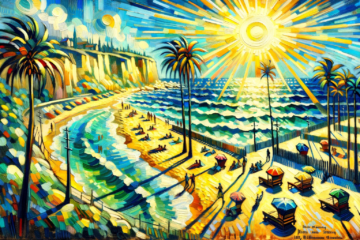The Balkans, a slice of South Eastern Europe that borders the Adriatic sea to the west, and Mediterranean sea to the south, is home to medieval fortresses, magnificent mountains, amazing food and parties. Yes, it can get kind of weird with all its underlying political tensions, and some culture shock is to be expected, but the excitement and pleasure of it suprasses any inconveniences by far.
So just which cities are the best to live in the amazing Balkans?
- Sarajevo
- Belgrade
- Thessaloniki
- Ljubljana
- Zagreb
Keep reading to find out the best features of these Balkan destinations, their cost of living, populations and expat culture, in order to help you decide which is the best for you!
Sarajevo, Bosnia and Herzegovina
Located in the federation part of Bosnia and Herzegovina, Sarajevo is both the capital of the country and of culture in all of the Balkans. With a small population sitting in the valley of picturesque mountains, this city is a great option for those craving a melting pot society.
It is surrounded by the Dinaric Alps, and built on the Miljacka river. Here is some basic information about what the city has to offer:
- Population: 280,000 people
- Cost of living: $600 USD per person for a month
- Expat community: there is a sizeable expat network
- Location: West Balkans
- Visa: Bosnia and Herzegovina does not mandate a visa for the citizens of the US, UK and Canada. They can enter Bosnia and Herzegovina with their passports. For other nationalities, check with an embassy.
As you walk through Sarajevo, you can witness living history, including medieval cobblestone streets, small trade shops, traditional food and artifacts through the ages. You’ll also see prominent remnants from the time the country was ruled by the Ottoman Empire, and the population is still predominantly Muslim as a result. There are active and beautiful mosques, but strict religious views are mostly lost when it comes to the younger population.
Locals are some of the warmest, friendliest and most relaxed in the Balkans. They are always happy to show you around and direct you to interesting sights, such as:
- Baščaršija, the old bazaar
- Olympic village
- Olympic museum
- Museum of Contemporary Art
- the best bars, clubs and concert venues
It’s also worth noting that the Sarajevo Film Festival gained international attention and recognition for being the largest in Europe. Formed in 1995 during the siege of Sarajevo in the Bosnian war, it has only grown better and more refined over time.
In order to get around in Sarajevo, trams are at your disposal, as well as buses and taxis. Transportation is very cheap, and you can get monthly public transportation passes.
There is no digital nomad visa in Bosnia yet, but travelers can obtain a tourist visa, business visa or resident visa.
Belgrade, Serbia
Belgrade was the capital city of the ever-changing Yugoslavian states since 1921, and it has kept a central hub vibe of the Balkan region ever since. Nested between the Sava and Danube rivers, it has inspired many local and international artists with its beauty, livelihood and passion.
It’s a great city to live in in the Balkans for many reasons, one of them being its large and active expat community, coworking spaces and work-friendly cafes. People from all walks of life and occupations gather in this international capital to exchange ideas and experiences. Locals are very welcoming as well, and they will especially love you if you learn a couple of Serbian phrases, like the following:
| Serbian expression | English translation |
| Dobar dan! | Good day! |
| Hvala! | Thank you! |
| Kako si? Dobro. | How are you? Good. |
The city has a contemporary style of living within a relaxed and sometimes disorganized system, which creates an almost bohemian feel. There’s also a plethora of cultural manifestations, workshops, restaurants, active nightlife and an international population, making Belgrade seem like a Balkan metropolis.
- Population: 1.3 million people
- Cost of living: $850 per person per month
- Expat community: it’s pretty large in the context of the Balkans!
- Location: Western Balkans
- Visa: Serbia is not in the European Union, but many third country nationals can get a tourist visa upon arrival. The ‘long term visa,’ or visa D, allows you to stay in Serbia for 90 to 180 days.
Belgrade’s amazing value for money
Belgrade is super affordable compared to its neighbor Croatia, making it extremely attractive to many expats.
There is always something to do in Belgrade. Local festivals are particularly very exciting, and they are constantly happening almost all year long. Some examples of festivals that you can find are:
- Belgrade Jazz Festival
- Hand crafts market
- Homemade food festivals
- Drink festivals
- Vintage markets
- Belgrade Dance Festival
- Music get-togethers and workshops
To get around Belgrade, you can use local public transportation, such as buses, trams, trolleys or taxis. You can also use Yandex taxi or CarGo, which are the equivalent to Uber in the city. But regular taxi companies, like the Pink and Gold taxi companies, are super cheap compared to western Europe taxi prices.
Like many others, you will not make a mistake by at least visiting Serbia’s capital, since it truly is one of the best cities in the Balkans.
Thessaloniki, Greece
Thessaloniki is a happening, Mediterranean option for Balkan-loving expats looking for a major city by the sea. Here’s some basic info about it:
- Population: 1.3 million people
- Cost of living: $750 per person per month
- Expat community: some expat communities and large student communities
- Location: South Balkans
- Visa: Greece is in the European Union, and so Schengen Visa rules apply. Also, Greece has a digital nomad visa. It can be obtained in Greece, with proof that an individual will provide work for an employer.
Greek passion for life is unmatched and is very contagious!
Thessaloniki is another great city to live in in the Balkans
Thessaloniki is considered to be the cultural capital of Greece. It is home to Aristotle University–the largest university in the Balkans. This means that there are large local and international student communities, creative projects, university programs, etc.
Thessaloniki has had an important role in political and cultural spheres since its founding in 315 BC. Throughout history, it was part of the Roman, Byzantine and Ottoman empires. In World War I, it resisted fascist state attacks, and then ultimately succumbed to them in the second world war. Unfortunately, it was destroyed and rebuilt multiple times due to its location and constant attacks. As a result, there is to this day, a large Jewish and Turkish population in Thessaloniki, which enriches the city beyond just being natively Greek.
Here are some of the city’s amazing historical landmarks:
- Trigonion tower – historic site and observation point
- Osios David in the Latomou Monastery – church, mosaics
- Bezesteni Market – Ottoman heritage
- The Jewish Quarter
- Ladadika district – historic neighborhood
The city today is very modern, lively and diverse. It’s great for anyone who likes to get lost in crowds and enjoy a slightly faster-paced environment.
Ljubljana, Slovenia
The capital and largest city of Slovenia, Ljubljana, got its name after the Ljubljanica river that runs through the region. The river separates the old and modern areas of the city. Ljubljana is also a green city. Citizens actively partake in keeping the environment clean and healthy by getting around on bicycles, recycling and expanding the green surfaces. Many parks and forests are perfect for picnics and simply enjoying bright days. Be sure to visit the ever expanding Tivoli Park!
Nature sites like Triglav mountain, Bled and Bohinj lakes are close to Ljubljana as well, and they are a must see.
Ljubljana has a strong underground culture
There’s a lot to do in this Slovenian capital, from skating, graffiti, squats, concerts, panels and activist organizations. Rich medieval and modern history fits perfectly in dreamy Ljubljana. And with many museums, galeries and festivals, it is every culture-junkie’s dream!
Ljubljana is also a student city. The University of Ljubljana, founded in 1919, is the largest and most central educational and research center in Slovenia. 30% of registered researchers attend this school, including foreign and local students.
Expat communities are also common in Ljubljana. Be it for work, education, holidays or permanent living, foreigners are welcomed and fit right into the civilized and forward-thinking capital. Here’s some more basic info:
- Population: 280,000
- Cost of living: 850$ per person for a month
- Expat community: in 2019 27,600 foreigners immigrated to Slovenia
- Location: Northwest Balkans
- Visa: Slovenia is in the European Union, where Schengen Visa rules apply
This city’s well-organized, safe and calm lifestyle is perfect for individuals and families alike. The country is strong, stable and has good public programs, and transportation is straightforward and affordable.
Zagreb, Croatia
- Population: 800,000 people
- Cost of living: $900-$1000 per month per person
- Expat community: in 2019, 28,000 foreigners immigrated to Croatia
- Location: Northwest Balkans, right below Slovenia
- Visa: Croatia is in the European Union, thus Schengen Visa applies. You can also apply for a digital nomad visa online.
Zagreb, Croatia’s capital
Both Croatia, and its capital Zagreb, are known for 18th and 19th century Austro-Hungarian architecture. As a geographically diverse country, Croatia’s crescent shape follows the coastline. With many islands as well, it is a perfect holiday destination and is visited by tens of millions of tourists in the summer months.
Zagreb is known as the center of rail, air and road transport in Croatia. Its main branches of economy are the service sector and hi-tech industries. With a diverse economy, it has a lot of work and development opportunities, providing a high standard of living.
Zagreb is also a city with a rich history that dates back to Roman times. Its old town is impressive, and its wide, colorful streets are great for both biking and taking a gingerly stroll. Its many friendly bars and people will make you feel right at home.
If you are an US citizen, click here to learn how to work for a US company while living abroad in Croatia, or anywhere else that interests you in the Balkans.
Want to live in the best cities in the Balkan?
Work remotely and fully enjoy Balkans charm! Here at Support Adventure, a remote MSP staffing company, we can help you do this. With many years of experience in hiring digital nomads, and operating fully online with our team of expats, we can support you on your nomadic adventures.
We are always looking for and hiring skilled:
- REMOTE IT help desk technicians for managed service providers
- REMOTE service desk coordinators (dispatchers) for MSPs
Feel free to fill out our application form, and we’re looking forward to seeing you in some of the best cities to live in the Balkans!



0 Comments